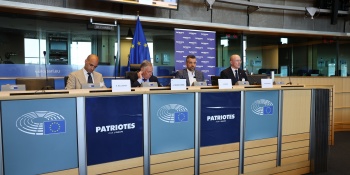Published: 19.10.2022

· The Court of Justice of the European Union issued a ruling on the resolution of the European Parliament of 11 November 2021.
· The CJEU stated that the resolution was merely a "written expression of a political position" and a "non-binding call to action".
· Previously, the Ordo Iuris Institute lodged a complaint against this document with the Court.
· The resolution contained false statements about Poland, incl. about the existence of "LGBT free zones".
· In this act, the European Parliament also called for the legalization of abortion as an alleged "human right", which is not justified by acts of international law.
· The resolution also contains statements that infringe the Institute's personal rights.
· The Court acknowledged that the content of the resolution may "damage the reputation as well as the good name" of Ordo Iuris.
The case already concerned the second resolution in which the European Parliament made false statements about Poland and in which it repeated the theses about the alleged existence of "LGBT-free zones" and a call for legalization of abortion, groundlessly called "human right". In both resolutions there was a similar wording about Ordo Iuris, violating the rights and personal rights of the Institute. Therefore, the Institute appealed against both resolutions under Art. 263 of the Treaty on the Functioning of the European Union, applying for annulment. In its complaint, the Foundation claimed that the European Parliament's resolution of November 11, 2021 was intended to produce legal effects against third parties. However, the CJEU did not agree with this position and dismissed the complaint seeking its annulment.
If the Court were to accept that the EP resolution was intended to produce legal effects, it would have to address the allegations raised. In the complaint, the Institute stated that the resolution violated the rights and personal rights of Ordo Iuris, which gave the Institute an opportunity to file a complaint. The Foundation alleged that the resolution was based on unverified and untrue information on the factual and legal status in Poland as regards the permissibility of abortion. The institute also argued that the resolution contained an unreliable analysis and interpretation of public international law on abortion (claiming that there was a right to abortion). Moreover, the complaint stressed that the resolution unjustifiably considers the protection of human life in the prenatal phase to be contrary to the EU values set out in Art. 2 TEU, primarily with the rule of law, ignoring not only the fact that the rule of law does not impose an obligation to allow broad access to abortion, but also the fact that the issue of the admissibility of abortion is not part of the common constitutional tradition of the Member States.
The Court held that the contested resolution "merely constitutes a written expression of Parliament's political position as regards the situation of the rule of law and fundamental rights of women in Poland, accompanied by non-binding calls to action addressed to the addressees of that resolution". As regards the claims made in the resolution on the Ordo Iuris Institute, the Court acknowledged that "whether true or untrue, they may damage the reputation as well as the good name of the applicant". However, according to the Tribunal, this is too little to declare the application admissible. He was not convinced by the arguments that the condition of seeking legal effects by the contested act should be read in the context of the right to a fair trial.
The Court held that decisive for the availability of an action for annulment of the resolution was the requirement that the contested act should produce binding legal effects. This requirement is not included in Art. 263 TFEU, but was formulated in the jurisprudence of the CJEU (formerly the European Court of Justice). In the legal literature and in the positions of advocates-general presented in proceedings before the CJEU, it is often postulated to relax this premise in favor of a fuller realization of the right to a fair trial and in favor of a linguistic understanding of Art. 263 TFEU. However, the Court did not avail itself of the opportunity to interpret this provision in favor of the right to a fair trial and the protection of individuals individually affected by legal acts issued by the EU institutions.
The described decision ended (not yet legally binding) the proceedings concerning the resolution of November 11, 2021. The proceedings following the complaint against the first resolution (of November 26, 2020) are still pending.

Wednesday's presentation in Brussels of the European Union reform plan developed by Poland’s Ordo Iuris Institute and Hungary’s Mathias Corvinus Collegium garnered significant interest. Nearly a hundred MEPs and their staff from many countries came to the presentation of this proposal.

• Amendments to the directive on the rights of victims of crime are currently under consideration in the European Parliament.

• The pressure on the European Union’s southern borders has continued unabated since the great migration crisis of 2015.

23.05.2025
We are currently engaging with think tanks and political parties across the continent to collaboratively develop a detailed counter-proposal to the centralist, anti-national, and anti-democratic vision of the European Union promoted by the European Parliament and President Macron.